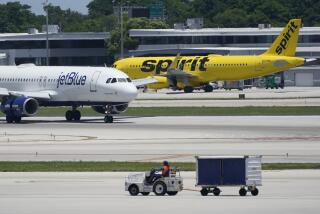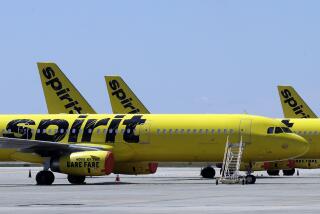Unfairly grounded
- Share via
RICHARD BRANSON may have to ditch his accent, renounce his loyalty to the British crown and drape himself in a U.S. flag. Driving a Mustang may help too. That’s apparently what it will take for U.S. authorities to allow Virgin America, the nascent U.S. airline that bears his popular brand name, to get off the ground.
It was partly Branson’s British citizenship that provoked the U.S. Department of Transportation on Wednesday to tentatively declare California-based Virgin America insufficiently American to do business in the U.S. In addition to not being under the “actual control” of U.S. citizens, the department found, Virgin America also violates the federal ban on foreign ownership of airlines because noncitizens control too much of it.
Thus was illustrated, yet again, the absurdity of this nation’s ban on the foreign ownership of U.S.-based airlines. The department said that because Branson recruited Chief Executive Fred Reid and licensed the airline under his Virgin brand name, Virgin America isn’t under the actual control of U.S. citizens. Yet under any definition of either “citizenship” or “control,” it’s a patently ridiculous finding. Two-thirds of Virgin America’s board of directors are U.S. citizens; so are Reid and the airline’s chairman.
But the foreign ownership ban is so ironclad that, for the federal government’s purposes, Virgin America can be grounded because of a license agreement to use a British brand name.
Well before Virgin America filed its application with the government, more than a year ago, Branson and the airline publicly distanced themselves from each other. Now, after a year of bureaucratic delays, Virgin America has two weeks to respond to the government’s findings. Enabling the decision were Continental Airlines and other carriers, which were eager to avoid competing with the low-cost airline and opposed its application.
If it ever flies, Virgin America plans to hire thousands of employees -- many of them in California -- and use San Francisco International Airport as its hub. And there are thousands more potential passengers, most of them U.S. citizens, who would benefit from increased competition.
California’s U.S. senators, Dianne Feinstein and Barbara Boxer, should not let the Department of Transportation’s findings go unchallenged. The department earlier this month gave up on its latest effort to allow more foreign ownership after its proposal sparked a fierce protectionist backlash in Congress. With Virgin America as Exhibit A, Feinstein and Boxer should take the lead in showing Congress how counterproductive it is to have this ban on foreign ownership.
More to Read
Inside the business of entertainment
The Wide Shot brings you news, analysis and insights on everything from streaming wars to production — and what it all means for the future.
You may occasionally receive promotional content from the Los Angeles Times.










